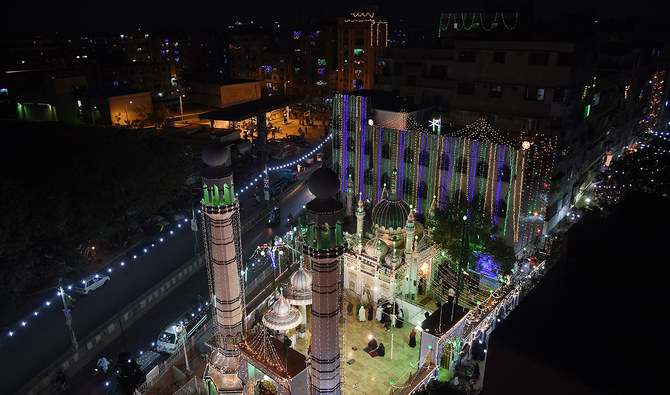KARACHI: For Wajiha Khan, going to the mosque for prayers was something only the men in her family did and which she could only wish for while growing up. But since Ramadan last year, the young woman has overcome family and community opposition and started praying regularly at a mosque near her home.
Muslim women’s groups and researchers around the world complain of a dearth of worship spaces for women, since most mosques are gender-segregated and men dominate the main prayer rooms. Commonly women are relegated to praying behind the men, or in other quarters like basements, hallways or on another floor altogether where the imam’s sermon is broadcast over speakers.
In many Muslim nations like Pakistan, very few women have traditionally prayed at mosques, though this culture is changing, and many like Khan, a fashion designer, now offer nightly prayers regularly at the Khalid Bin Waleed Masjid in Karachi.
But it wasn’t easy for her at first as her family opposed her praying outside the home.
“I belong to a normal [Pakistani] family where women could not go to the mosque, where it was said, ‘Don’t go, don’t send them’,” Khan told Arab News as she took a break from offering Taraweeh prayers earlier this week.
But last Ramadan, Khan said she was able to convince her family to change their mind and permit her to offer prayers at the mosque.
Taraweeh prayers are special nightly prayers held at mosques throughout the world during Ramadan. Worshippers stand for hours during the service, in which long portions of the holy Qur’an are recited by a prayer leader.
In a significant move toward gender inclusivity in religious spaces and to draw more women to mosques, the provincial government of Sindh in December 2023 directed 77 mosques to ensure separate spaces for women.
Such edicts had helped to bring more women to mosques, said Anisa Iqbal, a volunteer at Khalid Bin Waleed Masjid.
“MashaAllah, it is increasing every year,” Iqbal told Arab News. “This year, there are more than three hundred women [offering Tarawih], and Alhamdulillah, we have 36 sisters sitting in itikaaf,,” she added, referring to the Islamic practice of staying in a mosque for a certain number of days, mostly in Ramadan, devoting oneself to prayer and staying away from worldly affairs.
“We don’t impose restrictions on women when they go to markets, rather, we happily send them,” Iqbal said. “But when it comes to going to the mosque for prayers, we start imposing restrictions … I will send a message to everyone to send women to the mosque.”
At another mosque in Karachi, the Jamia Masjid Taqwa in the Gulshan-e-Iqbal neighborhood, hundreds of women offered Tarawih prayers in congregation earlier this month.
“On ordinary days, we have a large number of women coming for Friday prayers, but it’s evident in Ramadan that faith becomes fresh and everyone strives to participate actively in worship,” Nazia Faisal, a volunteer at the Jamia Masjid, told Arab News, saying up to 600 women came every night to the mosque.
Marriam Muhammad Aslam, another volunteer, said women of all ages were coming to the mosque this year for Taraweeh prayers.
“Certainly, there are initially some objections within everyone’s household,” she said, but family members gave in when they began to “see the change” in an individual after they frequented mosques.
“When family members begin to feel the change [in you] then they say, ‘Yes, this is the best place where we see the transformation within you, so you should go’,” Aslam said.
“And when women can do everything, run businesses, do everything, then why can we not go to the mosque?”
















